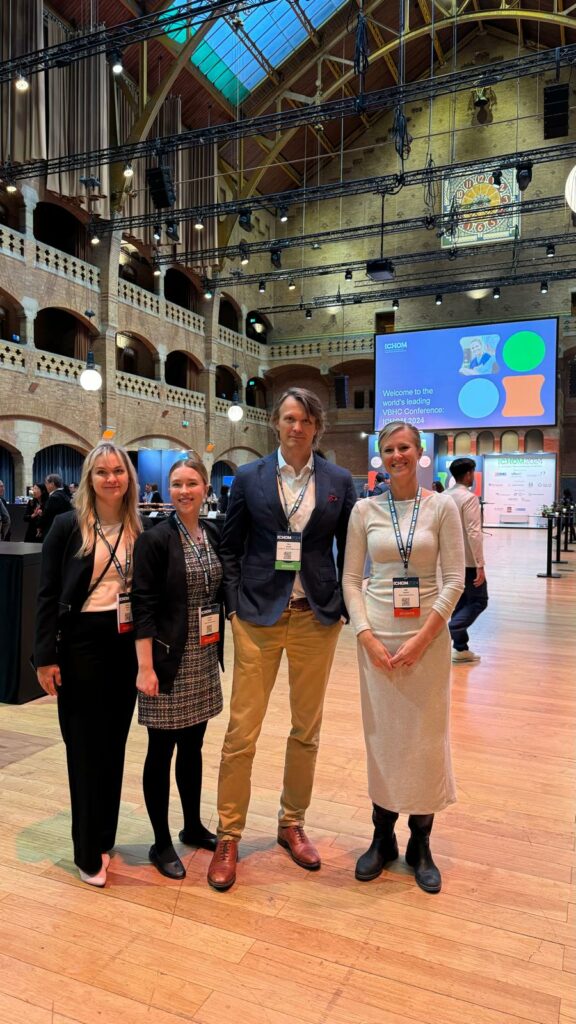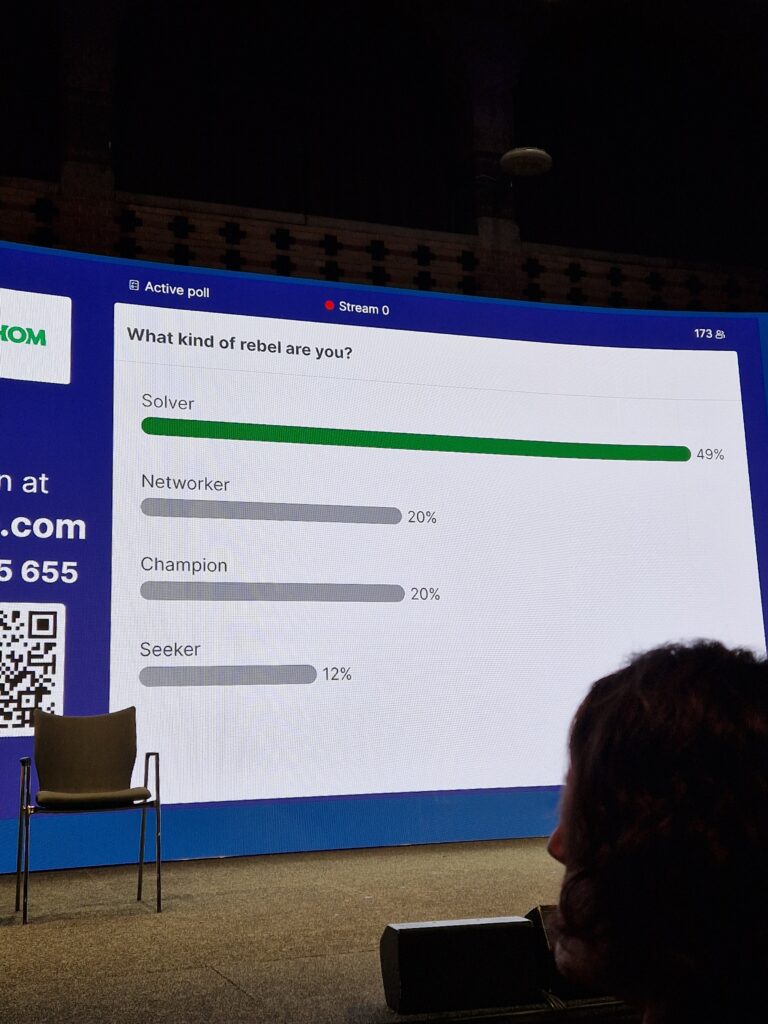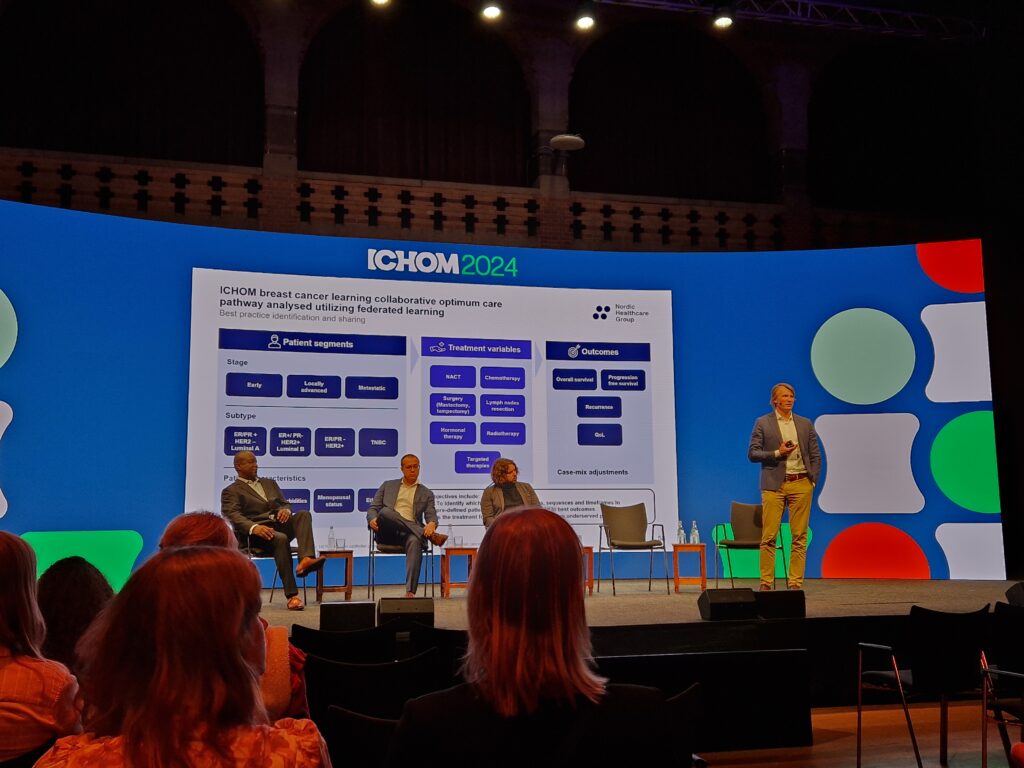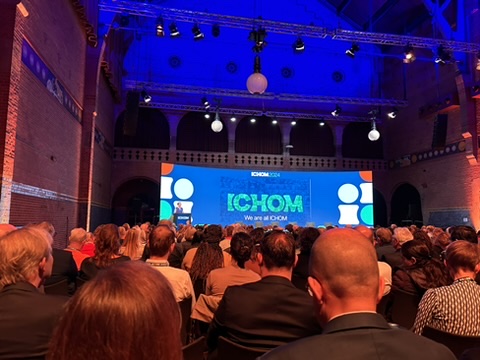In October 2024, the International Consortium for Health Outcomes Measurement (ICHOM) conference brought nearly 700 value-based healthcare experts from around the world to Amsterdam. I had the pleasure to attend the event with my colleagues Outi Isomeri, Anniina Cansel, and Vesa Komssi. This was not only my first ICHOM conference, but it was particularly rewarding as I had just returned to work from parental leave and was immediately able to hear about the latest developments in the field. In this blog post, I summarize our observations and reflections.

Practical Insights from Around the World
In his welcome speech, Dimitri Schakelaar from the Dutch Ministry of Health highlighted how governments should promote value-based healthcare (VBHC) through bold policies and investments, while also supporting the pioneers in the field. Schakelaar summed up the principles of successful change with three factors: policy, technology, and behavior—emphasizing that the significance of behavior in change is often underestimated. More often, the lack of technology is perceived as a limiting factor.
Susannah Fox, author of Rebel Health and former Chief Technology Officer at the U.S. Department of Health, brought to the discussion the active role of the patient in healthcare development. Fox spoke about the patient’s role through four different archetypes: seekers of information, networkers, problem solvers, and advocates—reminding us that all these roles can collectively build not only patient-centered but patient-led change. In which group would you put yourself?

In the panel discussions, international group of panelists openly shared their experiences with implementing value-based healthcare. The importance of collaboration between patients, healthcare providers, and payers was strongly emphasized. The Netherlands follows a strategy that combines national guidance with bottom-up initiatives, while Saudi Arabia has standardized the collection of patient-reported outcome measures (PROM) nationally by the Council of Health Insurance.
One of the conference’s most interesting panel discussions focused on the needs of the elderly and improving health outcomes at different stages of life. Aging presents challenges to healthcare systems, and it is important to understand how the needs of elderly people in different life situations differ. The discussion explored which outcomes matter most to different groups of older adults, such as those living independently at home, those needing long-term care, or those in palliative care. Outcome measures should be adapted to be meaningful for each group. Panelists shared examples of technology solutions and care models from around the world: Singapore, Italy, Canada, and South Africa.
“Start simply, simply start”
Practical experiences were also heard about implementing value-based care for coronary artery disease (CAD). This related panel discussion was led by Christian Thonke, Head of Public Affairs at pharmaceutical company Novartis, which has funded updates to the CAD standard set. The panel discussed how metrics can be implemented using a reduced set of basic measures instead of a broad standard metrics set, so that the change does not become too challenging to implement at once.
Collaboration between various stakeholders—particularly between the pharmaceutical industry and healthcare actors—was touched upon not only in the aforementioned panel discussion, but also in the roundtable discussion hosted by NHG’s Vesa Komssi, which concluded that different actors often share the same goal: to bring the most effective treatments into use. Trust can be increased by involving various organizations equally. On the other hand, collaboration can be accelerated by technologies such as data-sharing mechanisms (e.g., federated learning). In a panel discussion, Vesa shared how NHG has supported the ICHOM Breast Cancer Learning Community in optimizing care pathways using a federated learning platform. This enables cooperation between organizations without directly sharing patient data.

Reflections and Insights from NHG Experts
After two intensive days at the ICHOM conference, NHG’s Outi Isomeri was left with the thought that both PROM measures and clinician-reported CROM measures are valuable, but there is still room for improvement in their utilization. “It’s easier to respond to a lab value than to a patient-described problem, which is understandable but does not fully consider the patient. PROMs should be made rational and included in decision-making!” she summarizes.
Anniina Cansel, on the other hand, was inspired by the emphasis on patient engagement. “Patients should be equal participants in research and decision-making, not just patient-centered but patient-led,” she reflected.
Looking Ahead
Overall, ICHOM 2024 was inspiring and offered new ideas for our work in value-based healthcare. NHG has been an ICHOM implementation partner for years, and this work feels more important than ever. Next year, we are setting our sights on Dublin, where ICHOM 2025 will be held—hope to see you there!
Helena Henno, Director, Nordic Healthcare Group
helena.henno@nhg.fi / +358 50 4110847
